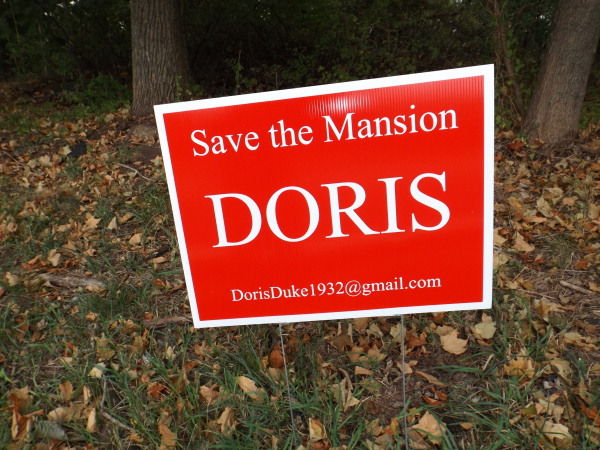By Gene Robbins, Managing Editor
Superior Court Judge Yolanda Ciccone said Friday she would rule by the end of next week on the request to rehear the application that allows the demolition of tobacco heiress Doris Duke’s home within the 2,500-acre estate in northern Hillsborough.
The judge heard arguments from a citizens’ group trying to stop the Duke Farms Foundation from razing the 65,000-square-foot building. Duke Farms applied in June for a demolition permit, and, after three hearings before the Historic Preservation Commission, ruled, 6-1, in October to allow the process to apply for the demolition permit to proceed.
Duke Farms has been granted the permit, but is holding off the final demolition until the court case is decided.
Much of Friday’s hour-long hearing centered on the move by a citizens’ group named DORIS, an acronym for Demolition Of Residence Is Senseless, to insert into the record an opinion from a National Park Service official that the house has historical significance.
If the Historic Preservation Commission had heard the testimony of William Bolger, National Landmarks Program Manager of the National Park Service, it might have come to a different conclusion, argued David Brook, the attorney for DORIS. The commission ruled, 6-1, in September to allow the demolition process to proceed.
In a letter to the court last week, Mr. Brook called the letter “an incredibly significant legal analysis provided by a federal government national expert of historic preservation.”
Judge Ciccone appeared mostly interested in the assertion by DORIS that the preservation commission had come to an “arbitrary and capricious” decision, the legal standard DORIS had to prove.
After hearing Mr. Brook, Hillsborough Township’s attorney William Willard and Jeffrey LaRosa, attorney for Duke Farms Foundation, the judge succinctly said she had heard arguments and would render a ruling by the end of next week. She adjourned the hearing without further comment from any of the parties.
Asked afterwards if anything new had been covered in the hearing, Michael Catania, the executive director of the Duke Farms, said, “We gave the objectors their day in court.”
Mr. Brook, a Hillsborough resident volunteering his time to DORIS, said he felt his side “had an opportunity but that it was incomplete.” He said he come to argue each of the five points made in his legal argument, but that some were touched upon only lightly, if at all.
Other assertions alleged violations of the Open Public Records Act and Municipal Land Use Law, in addition to the commission “failing to render a fair and impartial” decision. He asked the court to remand the matter back to the township for a rehearing.
“All we are asking for is a fair shake at the process,” he said.
Mr. Brook admitted that he had “prematurely” closed the opponents’ case at the Sept. 24 hearing, and then asked the board at the Oct. 15 meeting to hear the testimony of Mr. Bolger, who would have presented “high-quality contradictory information,” he said. The board’s decision not to hear the testimony indicated “a rush to judgment,” he said.
In a letter submitted to the court, Mr. Brook cited Mr. Bolger’s comments that the Doris Duke home is “a component that contributes to the overall integrity of the historic district that it is a part of is beyond dispute, and its demolition will certainly represent a loss of one of the historic district’s most distinctive, and perhaps most important, features.”
Mr. Willard said Mr. Bolger attended the Sept. 24 meeting, but never came forward to speak, either as a DORIS witness or for himself At the Oct. 15 meeting, Mr. Brook wanted to reopen the record with testimony from the township tax assessor and Mr. Bolger, but neither attended that night, Mr. Willard said.
In response to DORIS’ assertion the commission had little discussion about the case’s merits or the drafting of the resolution, Mr. Willard said it was standard procedure for the board’s attorney to draft a document and submit it for members’ consideration.
He said the final meeting alone had given 90 minutes for public comment, as well as a half-hour for each attorney to sum up. He called that ample time and consideration given by the board.
Mr. LaRosa told the judge that the house was not the Duke Mansion that owner James Buchannan Duke had envisioned (one was started, but abandoned), but a farmhouse that had been bought in 1893 and expanded and renovated several times over the decades. Duke Farms’ historical expert Emily Cooperman testified that the overlapping and even contradictory work made the house an architectural patchwork with little significance.
Mr. LaRosa said Doris Duke’s legacy continues in properties preserved in Hawai’i and Rhode Island, and that Duke Farms was more the legacy of “Buck” Duke and his grander concept to preserve agriculture and horticulture.
He said much of what Mr. Bolger wrote in his recent letter had been covered by testimony by Mary Delaney Krugman, the expert historic architecture presented by DORIS.
He said the preservation commission acted “honestly and with due consideration.”
Mr. LaRosa also said that DORIS was mistaken in calling the property “quasi-public” because it used public funds to renovate buildings and by the fact that tens of thousands of people visit the property annually for free.
Mr. LaRosa said the historic aspect of Duke Farms was in the overall 2,500 acres and its dedication to agriculture and environmentalism, and not that each building was significant. The building was not spectacular, he said, and its demolition would allow Duke Farms to open up about 50 more acres for the public’s enjoyment, he said.

